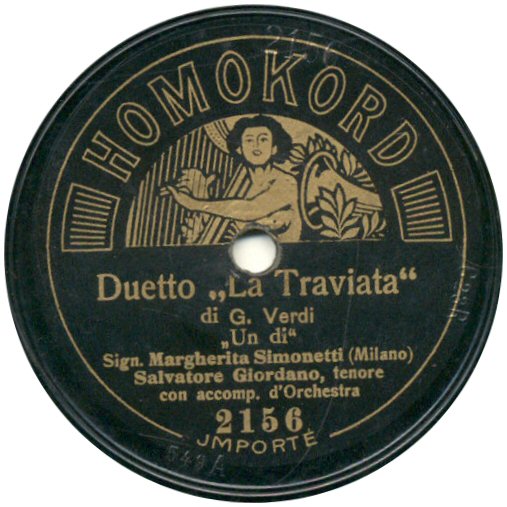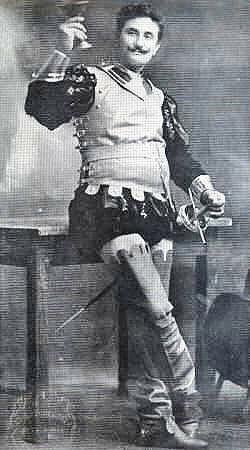Salvatore Giordano
born 1879 Caronia/Messina
Giordano studied singing in Palermo and made his debut in 1906 at the Teatro Andronico in Taranto as José.
For a few years, he sang in Europe (for instance, in Thessaloniki, Varna, İstanbul, Sevastopol, Simferopol, Ekaterinoslav/Dnipro, Poltava or at the Berlin Krolloper), but very rarely in Italy.
In 1911, he moved to the USA; since he gave regular concerts in New York City (from Aeolian Hall down to
Chickering's piano store during their September 1914 annual clearing sale, including lots of private concerts in the mansions of
wealthy families), I suppose he may have lived there. He appeared in opera, immediately after immigrating, with the Constantino
Grand Opera Company in Havana and New Orleans, as the understudy for Florencio Constantino himself.
In 1912, he gave concerts at the Maine festival in Portland and Bangor together with Lillian Nordica; from then on, his rather
pompous publicity had him advertised as "Nordica's tenor", not to mention "Chevalier Giordano", "the handsomest tenor on stage",
"the great Italian tenor from the Royal opera house Moscow" and "Caruso's protégé" or "Caruso's pupil", albeit he
was said to be... actually a teeny bit superior to Caruso! Whether or not the claim that Salvatore Giordano was the
great-grandson of Umberto Giordano was as truthful as the "Royal opera house Moscow" lie, I don't know.
In Maine, Giordano (Salvatore, mind you) was obviously a big favorite, appearing also in concert in Waterville, Foxcroft and
Belfast (all in December 1912), Ellsworth (February/March 1913) or Portland (October 1914).
In spring 1914, he participated in a New York Grand Opera Company tour with Faust, generally sung in English, with the
sole exception of Giordano who sang in Italian; they visited New Bern, Charlotte, Ellensburg, Raleigh, Savannah, Spartanburg,
Greenwood, Arkansas City, Rocky Ford, Asheville, Coffeyville, Laramie ("first grand opera ever heard in Laramie!"), Ogden,
Springfield, Lodi (California), San Diego, Ashland, Medford, Salem, Stockton, Tacoma, Aberdeen (Washington), Butte, Spokane,
Missoula, Dickinson, Bismarck.
From November of the same year, the New York Grand Opera Company with Chevalier Salvatore Giordano, but without a chorus
("chorus numbers will be sung by the united cast of great principals"), staged – in addition to Faust – also
Carmen, again in English, and appeared in Amsterdam (NY), Gloversville, Oswego, Rochester, Syracuse, Titusville, Utica,
Watertown, Clarksburg, Indianapolis, Urbana, Fairmont, Rock Island and, shortly before Christmas, in Madison, Wisconsin, where
the manager deserted the troupe after he had discovered that there was no money left.
In spring 1915, Salvatore Giordano sang Lyonel in Klamath Falls at the Medford Theater, and Turiddu, Canio, Gounod's Faust and
Don José at the People's Theater in New York. In fall 1915, Giordano sang again Faust in New York City, this time at B. F.
Keith's Palace on Broadway ("World's most exquisite music in vaudeville – Grand opera no longer a Metropolitan monopoly
– A tabloid version of Faust"). In January 1916, he was on Broadway again, at the Winter Garden in a vaudeville show
program.
Then he joined the Aborn Grand Opera company, with which he stayed until 1917: Brooklyn Academy of Music in March 1916 (Don
José, Hoffmann, Lyonel, Edgardo and Duca), Baltimore in May (Don José, Lyonel, Faust and Hoffmann), Pittsburgh in
May (Don José), the Bronx Opera House in June (Turiddu), Baltimore again in September and October, Washington, too, in
September/October (Gennaro in I gioielli della Madonna, Pinkerton and Rodolfo), Boston in October/November (same as in
Washington, plus Duca) Bridgeport in November, New York City (Park Theater, Gennaro and Pinkerton) in November/December,
Toronto (Don José) in March 1917, Detroit (Gennaro) in April, Providence (Faust) in May.
In January 1917, he was also Don José at the Cohan & Harris Theater in New York (probably unrelated to the Aborn Company?).
From June to August 1917, he sang the whole season at the Ravinia Park Festival near Chicago: Gennaro, Turiddu, Hoffmann, Edgardo,
Pinkerton, Duca, Nicias, Almaviva and Wilhelm Meister. And in October 1917, he was back at the Brooklyn Academy of Music as
Turiddu and Edgardo. I didn't find any appearances by Giordano after that.
That same fall 1917, however, he was peripherically involved in a murder case. He had been the lover of Maude King, a rich widow
who was probably killed by her "financial advisor", who had in fact dissipated her entire fortune on his own account. That
"advisor" was Gaston B. Means, a trickster (and spy for Germany), who later had the "honor" of being called "the most amazing
figure in contemporary criminal history" by the FBI's legendary director J. Edgar Hoover. In the Maude King murder case, he was
acquitted by the jury in spite of damning evidence.
References:
- Roberto Marcocci
- The Abbeville Press and Banner, 11 March 1914
- Aberdeen Herald, 26 May 1914
- Ashland Tidings, 11 May 1914
- Bismarck Daily Tribune, 14/19/20 June 1914
- The Bridgeport Evening Farmer, 7 November 1916
- The Commonwealth, 3 April 1914
- Daily Kennebec Journal, 23 December 1912 & 9 October 1914
- Daily Capital Journal, 15 May 1914
- The Daily Missoulian, 8 June 1914
- The Daily Telegram, 7/9/11 November 1914
- The Detroit Times, 7/11 April 1917
- Der deutsche Correspondent, 9 May & 24 September & 8 October 1916
- The Dickinson Press, 13 June 1914
- Ellsworth American, 11 September 1912, 5/19 February & 5/12/13 March 1913
- The Evening World, 9 September 1914
- Evening Star, 24 September & 1 October 1916
- The Fairmont West Virginian, 9/10/16 November 1914
- The Independent Reporter, 6 June & 21 November 1912
- The Laramie Republican, 21/22/24 April 1914
- Medford Mail Tribune, 13 May 1914
- The Ogden Standard, 23/27 April 1914
- The Republican Journal, 26 December 1912
- Rock Island Argus, 9/24 December 1914
- Rocky Ford Enterprise, 17 April 1914
- The Star, 31 October 1915
- The Sun, 30 January/3 December 1916 & 16 September 1917
- The Tacoma Times, 23 May 1914
- The Washington Herald, 24/28 September & 5 October 1916

Discography
Anker, Berlin, January 1909
02640 Traviata (Verdi): Parigi, o cara (w. Mandolesi) 989
02641 Faust (Gounod): Salve, dimora casta e pura 954
02642b Rigoletto (Verdi): Questa o quella 954
02643 Lucia di Lammermoor (Donizetti): Tu che a Dio 955
02644 Lucia di Lammermoor (Donizetti): Fra poco a me ricovero 955
Torna! (Denza) 970
Elisir d'amore (Donizetti): Una furtiva lagrima 970
02647 Adriana Lecouvreur (Cilea): La dolcissima effigie 989
Anker, Berlin, April 1909
3-02771 Mignon (Thomas): Addio, Mignon, fa core 109
2-02772 Mignon (Thomas): Ah! non credevi tu 109
1-02785 Pagliacci (Leoncavallo): Un tal gioco 110, Otello 110
1-02786 Pagliacci (Leoncavallo): No, Pagliaccio non son 110, Otello 110
Favorita (Donizetti): Spirto gentil 121
Favorita (Donizetti): Una vergine, un angiol di Dio 121
Tosca (Puccini): Recondita armonia 122
Adriana Lecouvreur (Cilea): L'anima ho stanca 122
02788 Barbiere di Siviglia (Rossini): Ecco ridente in cielo 123
02794 Barbiere di Siviglia (Rossini): Se il mio nome 123
Ideale (Tosti) 124
Maria di Rohan (Donizetti): Alma soave e cara 124
Allora ed oggi (Tosti) 125
Se (Denza) 125
Homocord, Berlin, 19 January 1909
2138 Lucia di Lammermoor (Donizetti): Tombe degli avi miei 2138
2139 Lucia di Lammermoor (Donizetti): Fra poco a me ricovero 2139
2140 Carmen (Bizet): Il fior 2140
Homocord, Berlin, 20 January 1909
2143 Vieni sul mar (Califano) 2143
2144 Tosca (Puccini): E lucevan le stelle 2144
2148 Manon (Massenet): Chiudo gli occhi 2148
2149 Cavalleria rusticana (Mascagni): No, no, Turiddu (w. Mandolesi) 2149, Cabezas 2149
Homocord, Berlin, 21 January 1909
2153 Andrea Chénier (Giordano): Un dì all'azzurro spazio, pt. 1 2153, Cabezas 2153
Homocord, Berlin, 25 February 1909
2154 Andrea Chénier (Giordano): Un dì all'azzurro spazio, pt. 2 2154, Cabezas 2154
Homocord, Berlin, 26 February 1909
2160 Fedora (Giordano): Amor ti vieta 2160
Homocord, Berlin, 9 March 1909
2162 Rigoletto (Verdi): Bella figlia (w. Simonetti) Disco Simplex 2162
2163 Barbiere di Siviglia (Rossini): Zitti, zitti (w. Simonetti) Disco Simplex 2163
Homocord, Berlin, 23 March 1909
2157 Traviata (Verdi): Parigi, o cara (w. Simonetti) 2157, Cabezas 2157
Homocord, Berlin, 1 October 1909
2206 Barbiere di Siviglia (Rossini): Ecco ridente in cielo 2206
2207 Favorita (Donizetti): Spirto gentil 2207, Lisboa 2207
Homocord, Berlin, 1909 (no specific dates known)
2155 Carmen (Bizet): Mia madre vedo ancora (w. Simonetti) 2155, Cabezas 2155
2156 Traviata (Verdi): Un dì felice eterea (w. Simonetti) 2156, Cabezas 2156
8510 Fedora (Giordano): Amor ti vieta 8510
Imperial, Wilmington, January 1918
x834C Carmen (Bizet): Il fior 3119
x836C Manon (Massenet): Chiudo gli occhi 3119
Sources for the discography: Gesellschaft für historische Tonträger, Wien;
Roberto Marcocci; Allan R. Sutton: Keen-o-phone, Rex and Imperial Records. Complete discography 1912–1918, online
publication 2023
Source for the portrait picture the extraordinary website of Roberto Marcocci.
|

